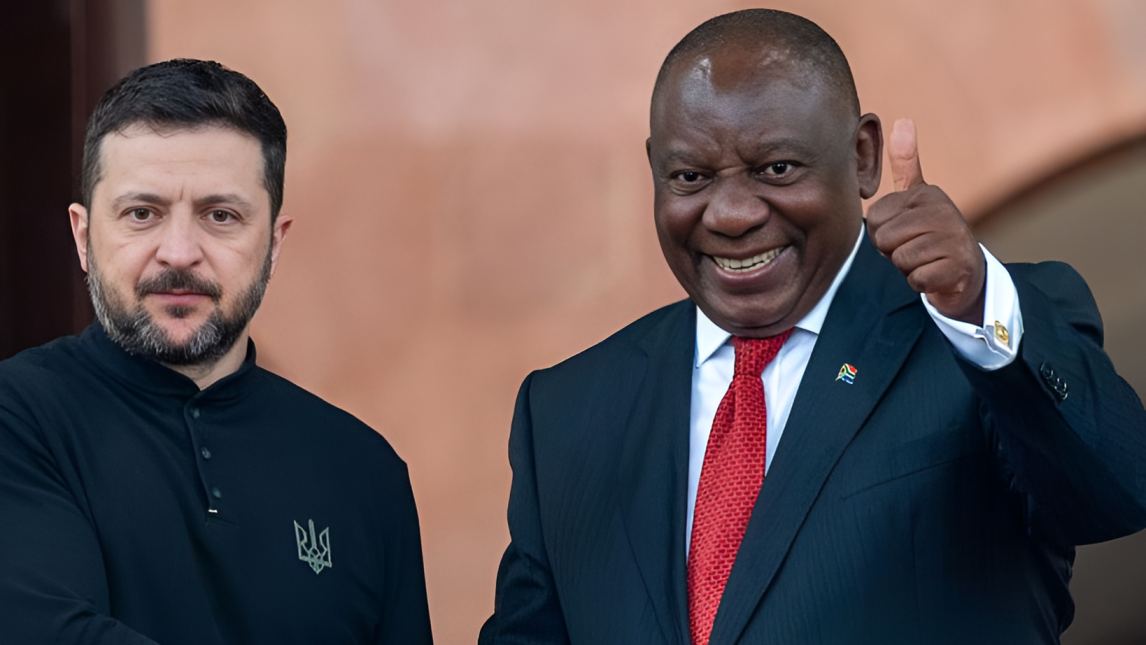South Africa and Ukraine have taken a major step toward stronger relations following a landmark visit by President Volodymyr Zelensky to Pretoria.
The visit marked a shift in both countries' foreign policy as they navigate troubled ties with Washington under the Trump administration.
Zelensky’s trip was the first by a Ukrainian head of state to South Africa in over three decades.
His presence was seen as a strong message against growing Russian influence in Africa and a way to build international legitimacy at a time when Ukraine's relationship with the United States has become tense.
"I'm sure that Russia will be annoyed by the visit, but I don't think it can do much about it," said Steven Gruzd of the South African Institute of International Relations.
However, Zelensky’s visit was cut short following an air strike by Russia on Ukraine’s capital, Kyiv.
He returned home immediately after meeting President Cyril Ramaphosa. Despite the disruption, the Ukrainian leader viewed the trip as a diplomatic breakthrough.
Ramaphosa said the meeting had "reaffirmed" the relationship between the two countries, calling it a historic moment and highlighting that it was Zelensky's first official visit to Africa since taking office in 2019.
Ukraine, once accused of ignoring Africa in its foreign policy, has increased its diplomatic presence on the continent over the past three years.
"Ukraine neglected the continent in terms of foreign policy, but it has changed that over the last three years, doubling its embassies from 10 to 20," Gruzd said.
Still, Ukraine faces stiff competition in Africa from nations like Russia, China, Turkey, and the United Arab Emirates. These countries are all working to expand their influence, especially in strategic regions such as southern Africa.
Zelensky’s outreach to South Africa also comes at a time when US support, once vital, has weakened.
Since returning to office in January, President Donald Trump has paused military aid to Ukraine, called Zelensky a "dictator," and placed blame on Ukraine for the ongoing war with Russia.
"Ukraine needs every bit of legitimacy it can get internationally, not just in Europe. Wars aren't only won in the battlefield, but also in courts of public opinion around the world," said Prof Siphamandla Zondi, a political analyst at the University of Johannesburg.
For Ramaphosa, hosting Zelensky was also a calculated move. South Africa has been under growing pressure from Washington, and Ramaphosa is keen to position himself as a global peacemaker.
"The US has turned diplomacy on its head," Gruzd said. "Everyone is looking for new friends."
Ramaphosa said his meeting with Zelensky focused on working towards a "comprehensive peace" and efforts to end the war.
He also confirmed that he had spoken with Russian President Vladimir Putin ahead of the Ukrainian leader’s arrival.
"We both affirmed the strong bilateral relations between our respective countries," Ramaphosa posted on X. "We further committed to working together towards a peaceful resolution of the Russia-Ukraine conflict."
Ramaphosa had earlier taken steps to mediate in the war by leading a delegation of African heads of state to Kyiv and Moscow in 2023.
That initiative came as South Africa faced criticism from the Biden administration for hosting a naval exercise with Russia and China, which raised doubts about its neutrality.
The situation worsened when the US ambassador in Pretoria accused South Africa of supplying weapons to Russia.
Ramaphosa set up a judge-led investigation into the matter, which found no evidence to support the claim. Despite this, relations with the US remained strained.
Trump’s view of South Africa has also deteriorated, especially after the country filed a genocide case against Israel at the International Court of Justice (ICJ).
He has also condemned South Africa’s treatment of the white-minority Afrikaner community, calling it "unjust and immoral", a claim that Ramaphosa’s government denies.
Prof. Zondi said South Africa would have to handle its diplomacy carefully. "South Africa will want to explain that it is adding to the efforts to build peace, and its role is not in competition with that of [the] US," he said.
In a move that seemed aimed at smoothing tensions, Ramaphosa announced that he had held a phone conversation with Trump about the Ukraine conflict.
He added that they agreed to meet soon. It would be their first meeting since Trump returned to office, and Ramaphosa is hopeful that it will improve relations.
Trump recently imposed a 30% tariff on South African goods, though he paused the decision for 90 days.
Ramaphosa hopes upcoming talks will ease the situation, as higher tariffs would hurt South Africa’s struggling economy, which is facing low growth and high unemployment.
During his discussion with Zelensky, Ramaphosa also focused on strengthening trade ties with Ukraine. Prof Zondi explained, "Any volume of trade, no matter how small, is critical for South Africa."
The analyst also pointed out that stronger ties could help Ukraine expand its reach in Africa. "South Africa could be Ukraine's gateway to Africa because of its ports and financial systems," he said.
He noted that even though Ukraine and Russia are competing for influence, Africa still relies heavily on both nations.
"Both Russia and Ukraine are the biggest exporters of cereals to Africa. Africa needs both. It cannot be expected to choose sides," he said.

